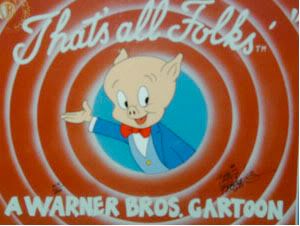Warner Backs Blu-ray, Tilting DVD Battle
By BROOKS BARNES
LOS ANGELES The high-definition DVD war is all but over.
Hollywoods squabble over which of two technologies will replace standard DVDs skewed in the direction of the Sony Corporation on Friday, with Warner Brothers casting the deciding vote in favor of the companys Blu-ray discs over the rival format, HD DVD.
In some ways, the fight is a replay of the VHS versus Betamax battle of the 1980s. This time, however, the Sony product appears to have prevailed.
The overwhelming industry opinion is that this decides the format battle in favor of Blu-ray, said Richard Doherty, research director at the Envisioneering Group, a market research firm in Seaford, N.Y.
Behind the studios decision are industrywide fears about the sagging home entertainment market, which has bruised the movie industry in recent years as piracy, competition from video games and the Internet, and soaring costs have cut into profitability. Analysts predict that domestic DVD sales fell by nearly 3 percent in 2007, partly because of confusion in the marketplace over the various formats.
HD DVD, however, is not dead. Two major studios, Paramount Pictures and Universal Pictures, have deals in place to continue releasing their movies exclusively on HD DVD, as does DreamWorks Animation. Warner Brothers, part of Time Warner, will also continue to release its titles on both formats until the end of May.
But by supporting Blu-ray, Warner Brothers, the largest player in the $42 billion global home entertainment market, makes it next to impossible for HD DVD to recover the early momentum it achieved.
While the specifics of the Blu-ray and HD DVD skirmish might be of interest only to insiders, the consequences of deciding a winner are not. Consumers have been largely sitting on the sidelines, waiting to buy high-definition players until they see which will have the most titles available. Retailers have been complaining about having to devote space to three kinds of DVDs. And the movie business has delayed tapping a lucrative new market worth billions. High-definition discs sell for a 25 percent premium.
Consolidating into one format is something that we felt was necessary for the health of the industry, Barry M. Meyer, the chief executive of Warner Brothers, said in a telephone interview. The window of opportunity for high-definition DVD could be missed if format confusion continues to linger.
In addition to Sony, a consortium of other electronics makers back Blu-ray. For Sony, Warners decision is a chance to rewrite history: the company faltered in its introduction of Betamax in the consumer market in the 1980s. Many analysts say the HD DVD players now risk becoming the equivalent of Betamax machines, which died out in large part because it became harder for consumers to find Betamax movies as studios shifted allegiance to VHS.
With Warner on board, Blu-ray now has about 70 percent of the market locked up; Walt Disney, 20th Century Fox, MGM, Lionsgate and, of course, Sony are all on Blu-rays team. Warner Brothers has some of the bigger releases in 2008, including Speed Racer, the Batman sequel The Dark Knight and the sixth Harry Potter installment.
This doesnt necessarily kill the HD DVD format, but it definitely deals it a severe blow, said Paul Erickson, an analyst at the NPD Groups DisplaySearch. When a consumer asks a store clerk which format to buy, that clerk is now going to have a hard time arguing for HD DVD.
In a prepared statement, Toshiba said it was quite surprised and particularly disappointed by Warners decision. We will assess the potential impact of this announcement with the other HD DVD partner companies, the company said. Universal Pictures declined to comment.
Warner Brothers has been courted for months by both sides. Toshiba dispatched Yoshihide Fujii, the executive in charge of its HD DVD business, to the studio three times in recent months, according to Time Warner executives who were granted anonymity because the negotiations were confidential. Sony has aimed even higher: Howard Stringer, the conglomerates chief executive, has leaned on Jeffrey Bewkes, the new chief executive of Time Warner.
Money was an issue. Toshiba offered to pay Warner Brothers substantial incentives to come down on its side just as it gave Paramount and DreamWorks Animation a combined $150 million in financial incentives for their business, according to two executives with knowledge of the talks who asked not to be identified.
Kevin Tsujihara, president of the Warner Brothers Home Entertainment Group, declined to comment on whether any payments were offered for support of Blu-ray. This market is absolutely critical to our future growth, he said in a telephone interview. You couldnt put a number on that.
For his part, Mr. Meyer said, Were not in this for a short-term financial hit.
Which high-definition technology is better has been the subject of intense debate in Hollywood and electronics circles for years. HD DVD players have been much cheaper than Blu-ray machines, but Blu-ray discs have more storage space and more advanced protections against piracy. Both versions deliver sharp resolution.
Consumers were inundated with marketing from both sides during the recent holiday season. Wal-Mart, as part of a temporary promotion, offered Toshiba players for under $100. Sony and its retailing partners, including Best Buy, responded by dropping prices on Blu-ray players, although not to the same level. Blu-ray players can now be purchased for under $300.
Still, Blu-ray was emerging as a front-runner as early as August. Blu-ray titles have sharply outsold HD DVD offerings by as much 2 to 1, according to some analysts and some retailers like Target started stocking only Blu-ray players. Blockbuster said last summer that it would carry Blu-ray exclusively.
Weve been monitoring the situation with consumers for a while now and they have clearly made their choice, Mr. Meyer said. We followed.



